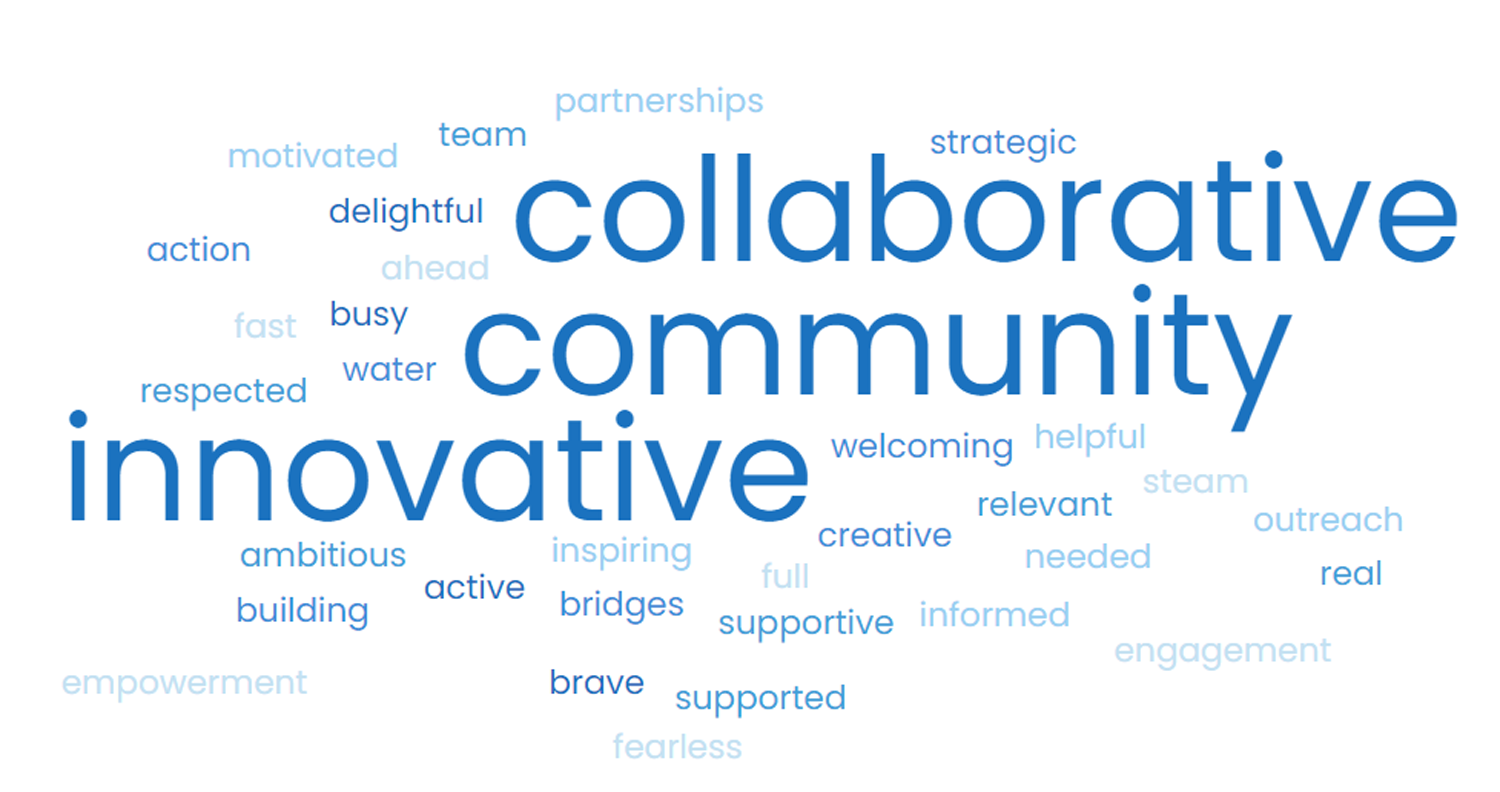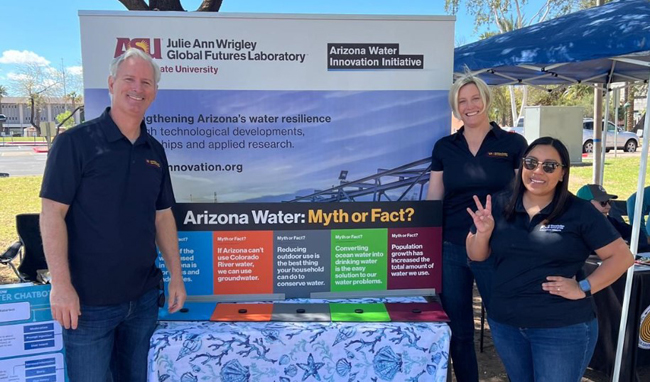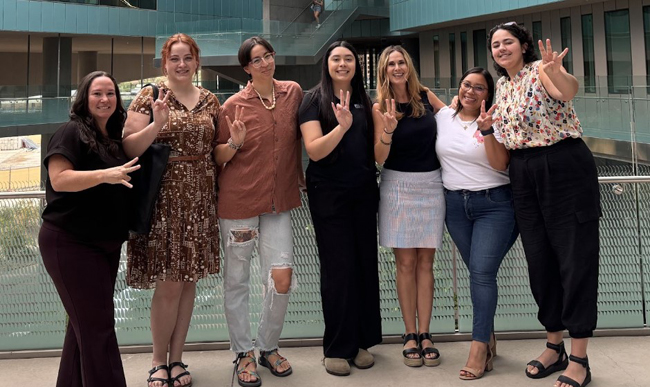
Impact Water - Arizona: Engage, empower, activate
Arizona residents are no strangers to water challenges. What they may not always realize is that they are also a key part of the state’s water solutions.
Impact Water - Arizona (IWA), a pillar of the Arizona Water Innovation Initiative, is a program focused on supporting Arizona communities to take action on the water issues that are most important to them.
The IWA program funds a variety of water-related community engagement projects led by ASU faculty and staff. Nearly $2 million in funding from the State of Arizona and the Virginia G. Piper Charitable Trust supports 18 project teams that are working to make a tangible difference across the state.
Susan Craig, the IWA director, emphasizes that innovative community engagement approaches are central to the program’s success.
“Connecting with people is key,” Craig explains. “We focus on making water data and resources accessible while fostering meaningful connections both within ASU and beyond. By funding projects and taking on strategic initiatives, we aim to empower people to take meaningful action and to drive positive change on Arizona’s water challenges.”
Marlene Rivas, the IWA program manager, shines a light on her experience working with funded project teams behind the scenes, from budgeting to coordination between collaborators.
“What I feel is special about IWA is that it’s action-oriented and relies on innovative engagement,” says Rivas. “Each round of projects brings new work that is vital for addressing water issues. The IWA network connects project teams with other communities, meets with local and state government agencies and creates initiatives that have measurable and meaningful impacts.”

These opportunities are all part of IWA’s commitment to bridge the gap between complex water research and public engagement. Each project team brings a unique perspective and diverse ideas to support positive community outcomes, and IWA-funded projects fall within four key workstreams.
First, projects under the science and technology translation workstream are bringing science to the forefront of everyday decision-making. By creating tools and visualizations that make intricate data accessible, IWA funded project teams are empowering communities to make evidence-based decisions about water.
A standout project here is the Arizona Water Chatbot 1.0, an AI-powered tool that offers tailored insights into Arizona’s water conditions, drought management and conservation practices. Each answer is based on authoritative sources of information that have been vetted by water management professionals, ensuring users receive informed solutions.
The inclusive engagement workstream, meanwhile, is all about fostering collaboration and ensuring a diverse range of voices contribute to water solutions.
For instance, the Project Cities’ Rural Water Decision-Making Framework project team recently brought together municipal leaders, K-12 educators and residents in the Verde Valley to design community-based water resilience projects. Prior research demonstrates that people lack awareness of how to engage in the public decision-making processes with water, despite supporting water solutions. This multigenerational workshop was designed to encourage diverse participants to work together to enhance water stewardship and community responsibility.
Engagement deepens further in the immersive experiences workstream, where the focus is on interactive learning and participation. From virtual reality simulations to hosting community events, the projects under this workstream offer residents a chance to truly experience and understand water issues on a personal level.
One exciting initiative, Water Narratives and Societal Change, brought storytelling into the mix. Students across various disciplines explored water issues through narrative writing and art in several ASU courses, then showcased their projects at an engaging public event. The result was an enriching experience that connected academic learning with real-world impact, making water topics come alive.
Finally, IWA is working to support policy impact decisions at the local and state levels by providing decision-makers with scientifically grounded insights.
One such project is Rural Groundwater: Policy Analysis & Community Mural. The project team is analyzing how residents in the Douglas Basin Active Management Area perceive rural groundwater management. The team aims to incorporate both community perspectives and scientific data into the state’s water strategies. The policy impact workstream is a key area of focus in IWA funding with significant potential for growth in the upcoming application period.
At the core of IWA is a simple but powerful theory of change: to catalyze understanding, awareness and knowledge of water challenges to inspire community action. Dayanara Avliez, the IWA program coordinator, shines a light on her experience working with the funded project teams.
“I am grateful for the ability to work on numerous projects all at once to varying levels of involvement, depending on their capacity. Every week brings new opportunities and challenges.”
“We are starting to see the program’s ability to create a ripple effect,” adds Craig. “The program fosters a dynamic network both internally, across ASU units and groups, and externally with community members, partners, and stakeholders from various organizations. We learn what they are doing and can help leverage their strengths and ideas. Then we have the ability to fund these projects to transform ideas into reality and implementation.”

To achieve this ripple effect, the IWA team is currently working on vital strategic initiatives. The first is a series of Rural Groundwater Resilience Workshops that aim to empower rural communities with the resources and knowledge they need to protect their groundwater supplies.
“Rural groundwater protection is a priority for the state of Arizona,” says Dave White, the program lead for the Arizona Water Innovation Initiative. “We are happy to be able to provide a neutral convening space and research-based information for communities on this critical issue.”
Michelle Oldfield, IWA community engagement specialist, reiterates the importance of the Rural Groundwater Resilience Workshops.
“It’s so much more than just hosting a series of workshops—it’s a community-driven movement to protect Arizona’s groundwater for future generations.”
Looking ahead to 2025, the program team is preparing for the upcoming funding cycle. They are collaborating with the IWA network and potential applicants to align statewide water priorities with project proposals, ensuring that ASU faculty and staff are well-positioned to secure funding for impactful research and innovative community engagement.
“It is essential to the success of every project we fund to consider how the people we are trying to serve actually think and act in the world,” says Claire Lauer, the AWII user experience architect. “This means listening to residents to discover what they currently understand about Arizona water, what they would like to know and how they can take action to make a positive impact.”
Finally, as IWA grows, the team is focusing on program evaluation. Through new projects, partnerships and strategic initiatives, the IWA team is producing measurable progress and adaptive learning critical to the success of the program.
To keep track of all of these efforts, IWA developed a Project Dashboard.
“We engage a wide range of communities, from rural farmers to the Latinx community, elementary and high school students to metro-Phoenix residents,” Rivas explains. “Ultimately, the goal is to share the valuable knowledge we’ve gained and consider every perspective when addressing water issues—there’s no gatekeeping here.”
As Arizona’s water challenges continue to evolve, so too will the role of Impact Water - Arizona. Craig envisions the program as a leading force in Arizona’s water sustainability goals.
“I’d like IWA to be seen as a go-to program for supporting communities to address their water issues. We’re building on the success of our past work, such as the workshop and new water alliance in Sulphur Springs, to create a program known for innovation in engagement.”
IWA efforts are already transforming how communities across the state understand and engage with water issues. Through innovative projects, inclusive collaboration and a commitment to lasting change, the initiative is paving the way for a more resilient and water-secure Arizona.
About the author: Lara Van Lith is a graduate research assistant at Impact Water - Arizona. She is currently pursuing a Masters of Public Administration where she focuses on environmental and education policy and nonprofit leadership.